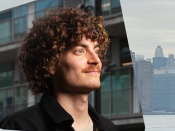Por Andrew Donnelly (EPAL / Águas de Portugal).
Lisbon distribution network, operated by EPAL, has been recognised as a best practice example in reducing Non-Revenue Water (NRW), featuring as a reference case study in the 2015 European Commission Best Practice guide on leakage management. Based on District Metered Area (DMA) implementation with permanent flow and pressure monitoring, the Water Optimization for Network Efficiency (WONE) methodology, developed and managed internally, has allowed EPAL to significantly reduce NRW to less than one-third of 2005 base-line values, whilst also improving service quality and reliability.
Much inspiration has come from IWA Water Loss Specialist Group activities, along with adaptation of best practices applied in other countries, with five principles underlying the WONE methodology, namely; Monitoring > Identification > Qualification > Localization > Rectification. The monitoring phase is provided by 160 DMAs within the network, which significantly decrease time and speed in identification of potential leakage problems, alerting the need for action in controlling leak run-time. A key element has been effective management of DMA monitoring data from over 3,000 telemetry points, in order to identify priority intervention zones and quantify recoverable losses – the Qualification principle. For this, EPAL has developed an innovative software application, correlating network monitoring data into a single interface, calculating practical performance indicators to assist the Localisation phase, in which leakage teams are directed to specific zones with estimates of expected leak reduction targets, bringing significant gains for operational efficiency.
On this basis, EPAL may be seen as an excellent example of turning IWA best practice theory into reality, being a successful, mature and sustainable NRW case study. EPAL’s NRW performance is comparable with the best European companies, within both the Economic Level of Leakage (ELL) and Sustainable ELL criteria. Whilst the principles and methodology developed have been successfully applied within EPAL’s own network and situation, they have also been applied in various other Portuguese utilities since 2010, where equally positive results have been obtained.
Inscrições livres, mas sujeitas a vaga (contactar camsilva@ciencias.ulisboa.pt).


















